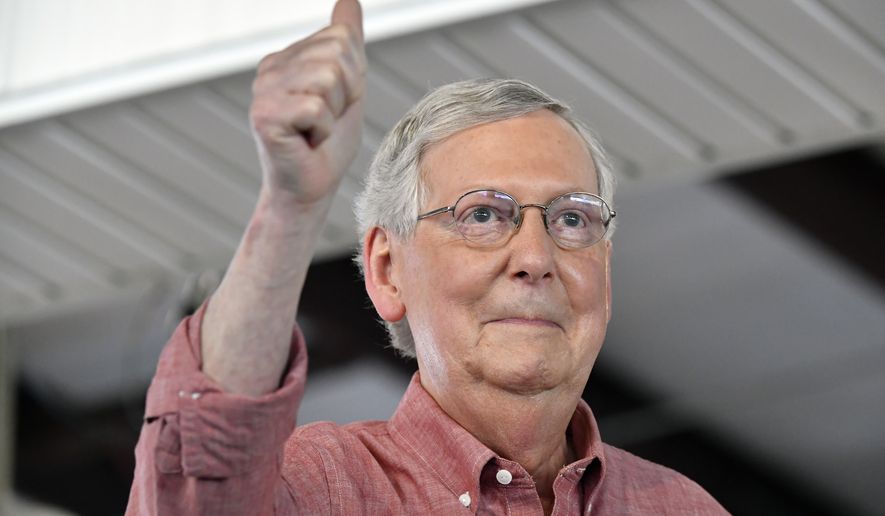OPINION:
Let’s get something straight: Fair elections and safe and secure elections are not the same.
Generically speaking, fair elections in the United States mean federal, state and local yokels cannot arbitrarily decide who can and cannot vote.
For example, U.S. immigrants with Spanish or Spanish-sounding names cannot be denied the right to vote simply because of their name.
Safe and secure elections mean ensuring that a Muriel Bowser who lives in Maryland cannot slip into a D.C. polling place, “identify” herself as a D.C. resident, and steal and cast a ballot — or vote twice.
Safe and secure elections also mean ensuring there are no cyberattacks on our election apparatus and that the U.S. Constitution isn’t kicked to the curb because of states’ rights.
House Democrats, you see, have latched onto something called the Securing America’s Federal Elections, or SAFE, Act. The House passed the legislation this summer, and then members started rolling their eyes and pointing fingers at Senate Majority Leader Mitch McConnell because the upper chamber waived the measure.
The Senate’s inaction could be a blessing in disguise, because it uncovered why Democrats and liberals are having a field day taking Republicans and conservatives to the wood shed as anti-democratic.
Said House Speaker Nancy Pelosi: “I just would really like to know from my Republican friends, what’s wrong with replacing outdated, vulnerable voting equipment? What is wrong with requiring paper ballot voting systems to ensure the integrity of our elections? What is wrong with enacting strong cybersecurity requirements for elections technology vendors and voting systems? We must be relentless in the defense of our democracy, fighting on all fronts to keep America safe.”
Economist/commentator Julianne Malveaux wrote this in her column after calling Mr. McConnell President Trump’s “handmaiden”: “Some of them [SAFE Act opponents] use a ’state’s right’ argument, suggesting that states can manage their own elections on their own terms. African Americans understand states’ rights all too well. States’ rights made it necessary for our nation to pass a Voting Rights Act, despite the guarantees included in the 13th, 14th, and 15th amendments. The question to ask is the questions Speaker Pelosi asked when the legislation came up for a vote on June 27. What’s wrong with election fairness?”
What’s wrong is the deceit. Handing a paper ballot to someone does not wipe out voter fraud or ballot box stuffing.
Handing a paper ballot to people who fraudulently identify themselves won’t curb voter fraud.
In D.C., all you do is give your name. The poll worker asks, “Is your address 2222 Boogie Woogie Avenue NW?” You simply answer “yes,” get a ballot and then head to a voting machine.
That’s not election security either.
Securing our elections means ensuring that cyberattackers can’t compromise our voter rolls, balloting and election technology.
What’s more is the Democrats and liberals want us to believe that not only will paper ballots keep our federal elections secure but the Department of Homeland Security, other federal agencies, and state and local agencies will get all that and other bureaucratic business done before the first caucus and primary ballots are in cast.
Do not laugh after checking out the SAFE Act to-do list:
⦁ Funding for “states to upgrade the security of the information technology and cybersecurity elements of voting systems, voter registration lists, and voter registration processes.”
⦁ Upgrade “voting systems and cybersecurity standards.”
⦁ Develop and print “paper ballot and manual counting requirements.”
⦁ Improve “accessibility to voting systems and ballot verification for individuals with disabilities.”
⦁ Improve “durability and readability requirements for ballots.”
⦁ Mandate “manual audits of results of elections.”
Russians and other cybersnoops are doubled over in pre-2020 howls.
It’s impossible for federal, state and local bureaucracies to move in sync in such a short period for several reasons. First of all, Congress is on recess until next month.
Second, the federal fiscal year ends Sept. 30.
Third, appropriations can’t be appropriated with Senate consent.
Fourth, unions have to be consulted with so much hiring and job descriptions being rewritten.
Fifth, who will snip the reams of federal, state and local red tape to made the to-do list happen? Mrs. Pelosi? The Congressional Black Caucus, which holds its annual legislative session in September? The ACLU? CASA?
As I said, that the Senate’s snub of the SAFE Act could be a blessing — albeit in disguise — but a blessing nonetheless.
⦁ Deborah Simmons can be contacted at dsimmons@washingtontimes.com.




Please read our comment policy before commenting.